综合英语六 Lesson One
外研版英语六年级上册Module 6 Unit 1 -课件
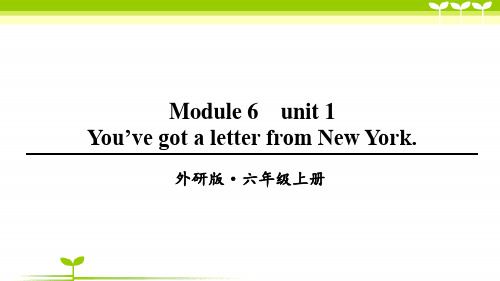
3. It’s difficult for me. 它对我来说是困难的。 difficult是形容词,意思是“困难的”。 主要指不容 易理解、不容易做或不好处理的事情。“某事+be difficult for+某人.”意思是“某事对某人来说是困难 的”。 【例句】 Singing is difficult for me. 唱歌对我来说是困难的。
2.I’ve got a book about the world. 我有一本关于世界的书。 “主语+have/has got+其他.”,这是用来表达“某人
有某物”。 【例句】 I have got a pet dog. 我有一只宠物狗。
have 的常见句型:
2 Listen and read.
Dear Sam and Amy, I am Daming’s friend and I want to be your friend too. I live in New York, but I am not American. I am from London in the UK. So we are all British! Do you like China? I want to visit China next year. Daming has got a Chinese dragon kite and we often fly it in the park. It’s difficult for me. Have you got a book about the US? I can send you one. Please write to me and we can be pen friends. Daming says he will write to you soon. Best, Luara
综合英语课文翻译练习及答案

Lesson One: The Time MessageElwood N, Chapman 新的学习任务开始之际,千头万绪,最重要的是安排好时间,做时间的主人。
本文作者提出了7点具体建议,或许对你有所启迪。
1 Time is tricky. It is difficult to control and easy to waste. When you look ahead, you think you have more time than you need. For Example,at the beginning of a semester, you may feel that you have plenty of time on your hands, but toward the end of the term you may suddenly find that time is running out. You don't have enough time to cover all your duties (duty), so you get worried. What is the answer? Control!译:时间真是不好对付,既难以控制好,又很容易浪费掉,当你向前看时,你觉得你的时间用不完。
例如,在一个学期的开始,你或许觉得你有许多时间,但到学期快要结束时,你会突然发现时间快用光了,你甚至找不出时间把所有你必须干的事情干完,这样你就紧张了。
答案是什么呢?控制。
2 Time is dangerous. If you don't control it, it will control you.I f you don't make it work fo r you, it will work against you. So you must become the master of time, not its servant. As a first-year college student, time management will be your number one Problem.译:时间是危险的,如果你控制不了时间,时间就会控制你,如果你不能让时间为你服务,它就会起反作用。
综合英语(一)上册词汇与短语
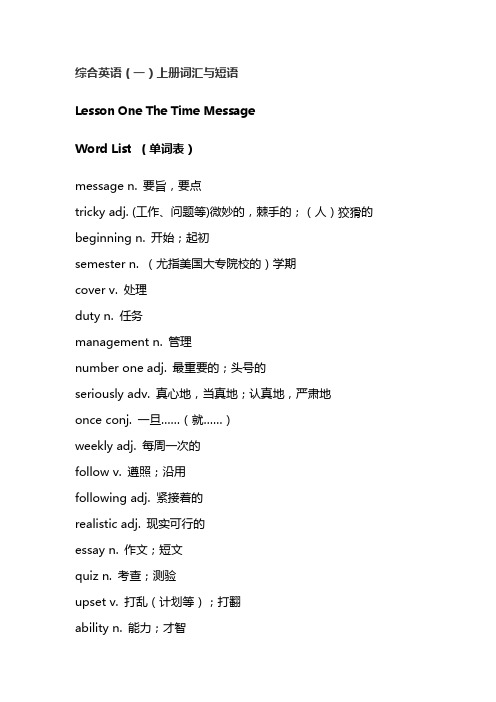
综合英语(一)上册词汇与短语Lesson One The Time MessageWord List (单词表)message n. 要旨,要点tricky adj. (工作、问题等)微妙的,棘手的;(人)狡猾的beginning n. 开始;起初semester n. (尤指美国大专院校的)学期cover v. 处理duty n. 任务management n. 管理number one adj. 最重要的;头号的seriously adv. 真心地,当真地;认真地,严肃地once conj. 一旦……(就……)weekly adj. 每周一次的follow v. 遵照;沿用following adj. 紧接着的realistic adj. 现实可行的essay n. 作文;短文quiz n. 考查;测验upset v. 打乱(计划等);打翻ability n. 能力;才智grade n. (考试或作业的)分数achieve v. 获得flexible adj. 灵活的re-plan v. 重新计划basis n. 基础;根据project n. 课题;科研项目mid-term adj. 期中的solid adj. 扎实的schedule n. 计划表alive adj. 起作用的;现存的;活着的assignment n. (指定的)作业activity n. 活动social adj. 社交的;交谊的seem v. 似乎;好像back adj. 以前的;过去的Proper NamesElwood N. Chapman 埃尔伍德·N·查普曼(人名)Useful Expressions(常用短语)Look ahead 看前面;考虑未来at the beginning of 在……的开始plenty of 大量的have time on one’s hands 有许多时间towards the end of… 即将结束时work for 为……效力work against 对……不利get the most out of sth. 充分利用……的机会put… into practice 付诸实践allow for 考虑到at least 至少in… case 在…… 情况下on a weekly /daily basis 每周/每天work out 制定出seem to be 看来,好像keep sth./sb. + adj. 使……保持某种状况run out (of ) (被)用完,将尽Time is running out.I have run out of money.take… some time to do… 花…… 时间做… …It will take us an hour to get there.depend on 取决于,随……而定It depends on how many people are goingso that 以便(用来引出目的状语从句)Tell me your telephone number so that I can call you when I have time.catch up on 赶上,补上I have to catch up on my sleep. I didn’t sleep much last night. Lesson Two Hans Christian Andersen’s Own Fairy Tale (1) Word List(单词表)fairy tale n. 童话,神话fairy n. 小仙子,小精灵shoemaker n. 鞋匠shoemaking n. 制鞋,补鞋prince n.王子princess n. 公主poetry n.诗(总称)act v.表演royal adj.王室的,皇家的sensible adj.(建议、主意等)合情合理的,明智的;(人)明智的,明白事理的stepfather n.继父weaving n. 编织weaver n.织布工unhappiness n.不幸福,不愉快tragedy n.悲剧,悲惨的事dancer n.舞蹈演员genius n.天才;创造力warm v.(使……)变暖,暖和for conj. 因为,由于frost n.霜woman-like adj.女人似的figure n.身影,人影writer n.作家,作者helping adj.帮助的finally adv.最后,最终beautiful美妙动听的high高音调的,尖声的break(男孩的嗓音)青春期时变低沉Proper Names(专有名词)Donald Peattie唐纳德·皮蒂Louise Peattie 路易丝·皮蒂Hans Christian Anderson汉斯·克里斯琴·安徒生Denmark丹麦Odense欧登塞(地名)Copenhagen哥本哈根(地名)Useful Expressions(常用短语)Once upon a time很久以前ask a favour of sb. 请某人帮忙look at看着believe in 相信,信任work hard at在……上下功夫pay for sth.支付……的费用be afraid to do sth. 害怕做某事change/turn …into…把……改变成……arrive in /at到达for ever永远from time to time不时的,常常lend a helping hand to sb.帮某人一把pretend to do sth.假装做某事not… at all根本不,一点儿也不He doesn’t know the meaning at all .start out出发,动身They started out to look for the lost boy.We starte d out at 7 o’clockadd sth. to sth.加上Please add your name to the list.out of sight从视线中消失(变得看不见)The ship was soon out of sightOut of sight, out of mind.(谚语:不见就忘。
综合英语(二)下册课文翻译及详解解析

综合英语(⼆)下册课⽂翻译及详解解析Lesson OneCourtesy: Key to a Happier World礼貌:⼀个更加愉快的世界的秘诀Dr. Norman Vincent PealeLearning Guide⼈⽣活在群体之中,为了解决⾃⼰的⾐⾷住⾏,处处都要与他⼈打交道。
即使是在英国⼈称之为―⾃⼰的城堡‖的家⾥,⼈们也必须和睦相处,才能相安⽆事。
风烟四起,⾆战连绵,轻者使团体和家庭⾯和⼼不和,重者会导致团体⽡解,家庭破裂。
处理好⼈际关系的秘诀是什么?本⽂作者在多年⼼理咨询⼯作中得出结论:以礼待⼈。
他认为,不可⼩看如何对待他⼈⼀事,礼貌不仅仅是个⼈举⽌问题,⽽且也反映⼀个⼈的⼈⽣观。
他还提出了⼀些化解⽭盾和冲突的具体建议,你不妨试试。
1 ①Many years ago trying to help people with every kind of trouble left me with one sure conviction: in case after case the difficulty could have been overcome — or might never have arisen — if the people involved had just treated one another withcommon courtesy. 多年以前,帮助⼈们解决各种各样的问题的过程使我深信:在⼀个个事例中,如⼈们相互以礼相待,问题完全可能会得到解决,或许根本不会出现。
①Many years ago trying to help people with every kind of trouble left mewith one sure conviction...多年以前,帮助⼈们解决各种各样问题的过程使我深信......Trying to help people with every kind of trouble caused me to believe one thing firmly…2 ①Courtesy, politeness, good manners — call it what you will, the supply never seems to equal the demand. 礼貌也好,客⽓,或⽂明举⽌也好,⽆论你如何称呼它,其供应似乎总是⼩于需求。
PEP小学六年级上册英语试题(答案及解释)
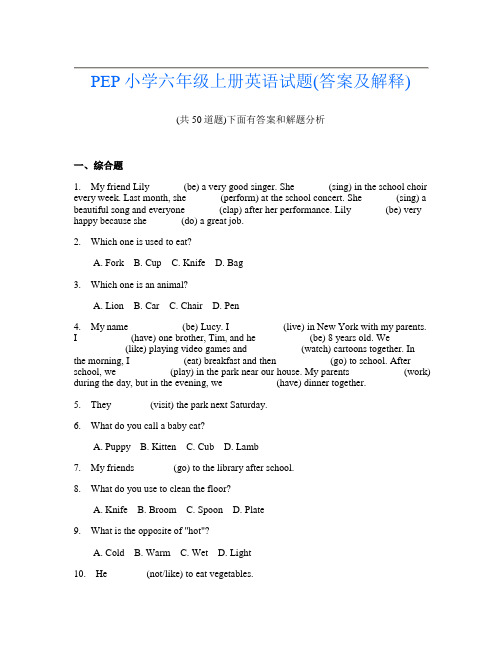
PEP小学六年级上册英语试题(答案及解释)(共50道题)下面有答案和解题分析一、综合题1.My friend Lily ______ (be) a very good singer. She ______ (sing) in the school choir every week. Last month, she ______ (perform) at the school concert. She ______ (sing) a beautiful song and everyone ______ (clap) after her performance. Lily ______ (be) very happy because she ______ (do) a great job.2.Which one is used to eat?A. ForkB. CupC. KnifeD. Bag3.Which one is an animal?A. LionB. CarC. ChairD. Pen4.My name __________ (be) Lucy. I __________ (live) in New York with my parents.I __________ (have) one brother, Tim, and he __________ (be) 8 years old. We__________ (like) playing video games and __________ (watch) cartoons together. In the morning, I __________ (eat) breakfast and then __________ (go) to school. After school, we __________ (play) in the park near our house. My parents __________ (work) during the day, but in the evening, we __________ (have) dinner together.5.They _______ (visit) the park next Saturday.6.What do you call a baby cat?A. PuppyB. KittenC. CubD. Lamb7.My friends _______ (go) to the library after school.8.What do you use to clean the floor?A. KnifeB. BroomC. SpoonD. Plate9.What is the opposite of "hot"?A. ColdB. WarmC. WetD. Light10.He _______ (not/like) to eat vegetables.11.Which of these is a type of transportation?A. DogB. BusC. TreeD. House12.We _______ (see) a movie tomorrow.13.We _______ (have) a party tomorrow.14.She _______ a book when the teacher came in.15.My father __________ (1) to the gym every Monday. He __________ (2) fitness exercises there, and he __________ (3) very strong. After the gym, he __________ (4) home and __________ (5) dinner. I __________ (6) to join him, but I __________ (7) busy with homework.16.She _______ (read) a new book every month.17.I _______ (study / studies / studied) English yesterday.18.I __________ (1) like ice cream very much. My favorite flavor __________ (2) chocolate. My friend Tim __________ (3) like ice cream because he __________ (4) think it’s too sweet. Yesterday, I __________ (5) eat three scoops of ice cream! My sister Lucy __________ (6) also love it. We __________ (7) often eat it together after school.19.They _______ (is / are / am) visiting their grandparents this weekend.20.We _______ (go) to school by bike every day.21.He _______ (not/like) to eat vegetables.22.Which of these is a part of the body?A. EyeB. SpoonC. ChairD. Table23.I ______ (not know) the answer to the question, so I ______ (ask) my teacher for help. She ______ (explain) it to me carefully, and then I ______ (understand) it. Now, I ______ (feel) more confident about my studies.24.In the morning, I __________ (1) brush my teeth and __________ (2) have breakfast. My mother __________ (3) make pancakes, and I __________ (4) drink a glass of juice. After breakfast, I __________ (5) put on my school uniform and__________ (6) leave home at 7:30. I __________ (7) take the bus to school.25.Which of these is the opposite of "big"?A. SmallB. HeavyC. FastD. Tall26.Which one is used to eat salad?A. KnifeB. ForkC. SpoonD. Plate27.I __________ (not understand) the math homework last night, so I __________ (ask) my teacher for help today. She __________ (explain) the problems to me, and now I__________ (understand) them. After school, I __________ (feel) much better because I __________ (finish) my homework. I __________ (go) home feeling proud of myself.28.I _______ (not/like) to eat spicy food.29.My family is going on a trip to the mountains next week. We __________ (1) leave on Monday morning. My parents __________ (2) drive us there by car. We __________ (3) stay in a small hotel for three days. In the evening, we __________ (4) enjoy the view from the hotel. I __________ (5) love hiking, so I __________ (6) go on a hike with my brother. We __________ (7) also take lots of pictures.30.We _______ (not/not) like to wake up early.31.What is the opposite of "big"?A. largeB. smallC. tallD. wide32.What do we use to write on paper?A. BrushB. SpoonC. PenD. Knife33.They _______ (not, like) to swim.34.We _______ (not / does not / do not) understand the lesson.35.They _______ (eat) pizza for dinner tonight.36.My sister and I __________ (1) to the market last weekend. We __________ (2) some fresh fruit and vegetables. Then, we __________ (3) bread and cheese. After shopping, we __________ (4) home and __________ (5) a delicious lunch together. We __________ (6) pasta and salad. It __________ (7) a nice day.37.I’m going on a field trip with my classmates tomorrow. We are going to the __ to learn more about animals. There will be lions, tigers, and __. I am most excited to see the big __ because I have never seen one up close before!38.Which of these animals has a long tail?A. CatB. ElephantC. FishD. Dog39.Which animal is the king of the jungle?A. ElephantB. TigerC. LionD. Bear40.They _______ (not/be) at home last night.41.I _______ (not/like) to watch TV.42.At school, we have different subjects. My favorite subject is __, because I enjoy solving problems. I also like __, where I can draw and create art. In the afternoon, I have __, and I practice playing the piano.43.Which of the following is the opposite of "hot"?A. WarmB. ColdC. CoolD. Lukewarm44.Which of these is used for cutting?A. ForkB. SpoonC. KnifeD. Plate45.I _______ (study/studies) English every day.46.Which of the following is an animal?A. TableB. CatC. ChairD. Pen47.Which sentence uses the plural form of the noun correctly?A. I have two cat.B. I have two cats.C. I have two catses.D. I have two cat’s.48.What color is an apple?A. PurpleB. GreenC. BlueD. Red49.They _______ (not/play) football on weekends.50.Which of these is a drink?A. BreadB. WaterC. CakeD. Banana(答案及解释)。
综合英语一lesson 1:The time message

on a weekly /daily basis
每周/每天
It’s necessary to do sth
solid /ˈsɒlɪd/adj. 固体的;结实的 schedule /ˈʃedjuːl/& /ˈskedʒuːl/
n. 计划(表);时间表
assignment /əˈsaɪnmənt/ n. 任务;作业;
tricky /ˈtrɪki/ adj. 狡猾的;机警的;棘手的 message /ˈmesɪdʒ/n. 消息;差使;启示 beginning /bɪˈɡɪnɪŋ/n. 开始;起点 semester /sɪˈmestə(r)/n. 学期;半年 cover /ˈkʌvə(r)/vt. 包括;处理/敷衍 duty /ˈdjuːti/ n. 责任;职务
2-(翻译) (1) 我们必须体谅他缺乏经验
. (2)时间不早了,可我还有那么多作业要补上
.
根据课文内容完成句子
(1) Time is dangerous because
it will work against you.
(2)Acording to the text “The time message”,time is dangerous because if
work out 解决;算出;制定出; try to do at least 至少 not only,but also 不仅..而且 keep+adj.:保持...的 keep sb up to 跟上..的进度
on
social /ˈsəʊʃl/adj. 社会的,社交的 society/səˈsaɪəti/ n. 社会;交往;社团
you don’t make it work for you ,it will
综合英语一课后练习翻译答案
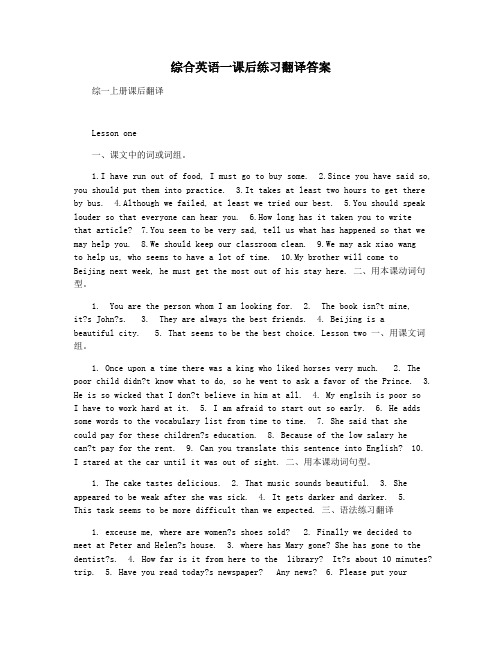
综合英语一课后练习翻译答案综一上册课后翻译Lesson one一、课文中的词或词组。
1.I have run out of food, I must go to buy some.2.Since you have said so, you should put them into practice.3.It takes at least two hours to get there by bus.4.Although we failed, at least we tried our best.5.You should speak louder so that everyone can hear you.6.How long has it taken you to writethat article? 7.You seem to be very sad, tell us what has happened so that we may help you. 8.We should keep our classroom clean. 9.We may ask xiao wangto help us, who seems to have a lot of time. 10.My brother will come toBeijing next week, he must get the most out of his stay here. 二、用本课动词句型。
1. You are the person whom I am looking for.2. The book isn?t mine,it?s John?s. 3. They are always the best friends. 4. Beijing is abeautiful city. 5. That seems to be the best choice. Lesson two 一、用课文词组。
综合英语教案
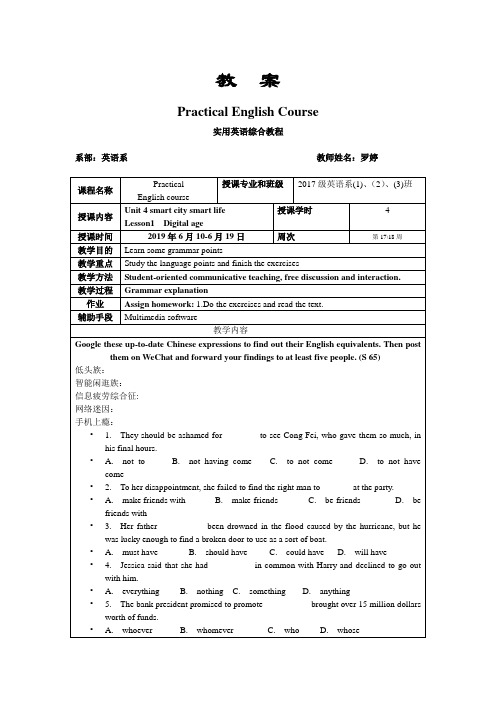
4.Lead discussions among students on the text and the topic of“new ways of payment”
教 案
Practical English Course
实用英语综合教程
系部:英语系教师姓名:罗婷
课程名称
Practical
Englishcourse
授课专业和班级
2017级英语系(1)、(2)、(3)班
授课内容
授课学时
4
授课时间
周次
第17\18周
教学目的
Learn some grammar points
drag n.拖,拉v.拖;缓慢地移动;故意拖延
dozen n.一打,十二个;十来个,十几个
downward a.向下的,下行的ad.[-(s)]向下地,下行地
compromise n.妥协,折中vi.妥协vt.危;浓缩的
composition n.构成,成分;作文,作曲;(音乐等)作品
•3. Her father __________ been drowned in the flood caused by the hurricane, but he was lucky enough to find a broken door to use as a sort of boat.
•A. must haveB. should have C. could haveD. will have
lesson one 原音辅音
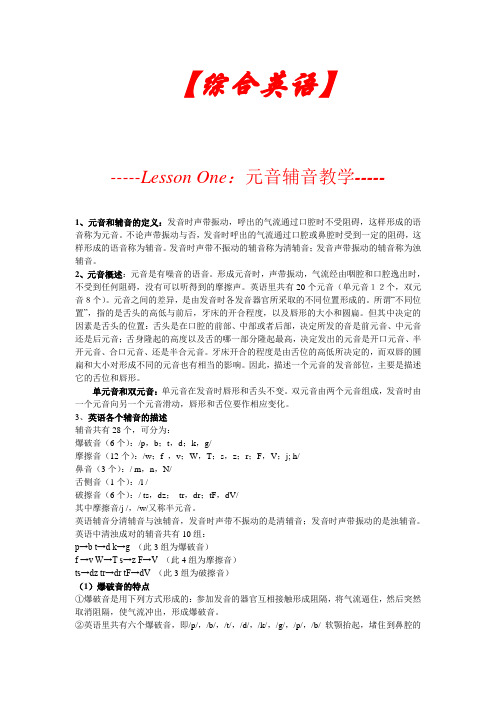
【综合英语】-----Lesson One:元音辅音教学-----1、元音和辅音的定义:发音时声带振动,呼出的气流通过口腔时不受阻碍,这样形成的语音称为元音。
不论声带振动与否,发音时呼出的气流通过口腔或鼻腔时受到一定的阻碍,这样形成的语音称为辅音。
发音时声带不振动的辅音称为清辅音;发音声带振动的辅音称为浊辅音。
2、元音概述:元音是有噪音的语音。
形成元音时,声带振动,气流经由咽腔和口腔逸出时,不受到任何阻碍,没有可以听得到的摩擦声。
英语里共有20个元音(单元音12个,双元音8个)。
元音之间的差异,是由发音时各发音器官所采取的不同位置形成的。
所谓“不同位置”,指的是舌头的高低与前后,牙床的开合程度,以及唇形的大小和圆扁。
但其中决定的因素是舌头的位置:舌头是在口腔的前部、中部或者后部,决定所发的音是前元音、中元音还是后元音;舌身隆起的高度以及舌的哪一部分隆起最高,决定发出的元音是开口元音、半开元音、合口元音、还是半合元音。
牙床开合的程度是由舌位的高低所决定的,而双唇的圆扁和大小对形成不同的元音也有相当的影响。
因此,描述一个元音的发音部位,主要是描述它的舌位和唇形。
单元音和双元音:单元音在发音时唇形和舌头不变。
双元音由两个元音组成,发音时由一个元音向另一个元音滑动,唇形和舌位要作相应变化。
3、英语各个辅音的描述辅音共有28个,可分为:爆破音(6个):/p,b;t,d;k,g/摩擦音(12个):/w;f ,v;W,T;s,z;r;F,V;j; h/鼻音(3个):/ m,n,N/舌侧音(1个):/l /破擦音(6个):/ ts,dz;tr,dr;tF,dV/其中摩擦音/j /,/w/又称半元音。
英语辅音分清辅音与浊辅音,发音时声带不振动的是清辅音;发音时声带振动的是浊辅音。
英语中清浊成对的辅音共有10组:p→b t→d k→g (此3组为爆破音)f →v W→T s→z F→V (此4组为摩擦音)ts→dz tr→dr tF→dV (此3组为破擦音)(1)爆破音的特点①爆破音是用下列方式形成的:参加发音的器官互相接触形成阻隔,将气流逼住,然后突然取消阻隔,使气流冲出,形成爆破音。
大学英语综合教程课后习题和听力答案
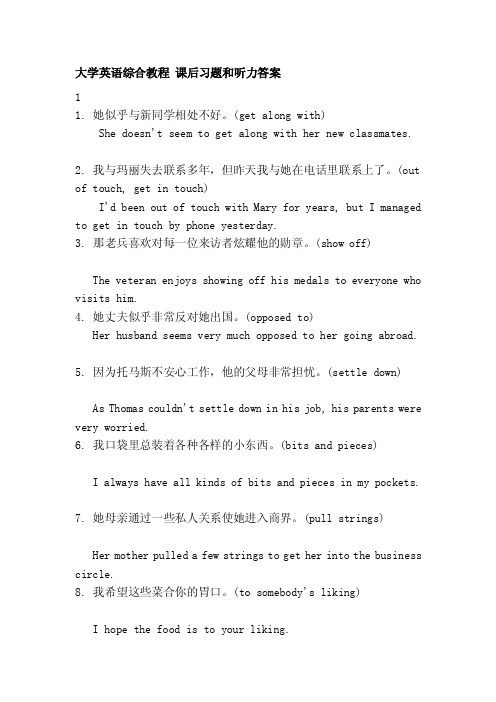
大学英语综合教程课后习题和听力答案11. 她似乎与新同学相处不好。
(get along with)She doesn't seem to get along with her new classmates.2. 我与玛丽失去联系多年,但昨天我与她在电话里联系上了。
(out of touch, get in touch)I'd been out of touch with Mary for years, but I managed to get in touch by phone yesterday.3. 那老兵喜欢对每一位来访者炫耀他的勋章。
(show off)The veteran enjoys showing off his medals to everyone who visits him.4. 她丈夫似乎非常反对她出国。
(opposed to)Her husband seems very much opposed to her going abroad.5. 因为托马斯不安心工作,他的父母非常担忧。
(settle down)As Thomas couldn't settle down in his job, his parents were very worried.6. 我口袋里总装着各种各样的小东西。
(bits and pieces)I always have all kinds of bits and pieces in my pockets.7. 她母亲通过一些私人关系使她进入商界。
(pull strings)Her mother pulled a few strings to get her into the business circle.8. 我希望这些菜合你的胃口。
(to somebody's liking)I hope the food is to your liking.9. 那些男孩太吵闹,我把他们骂了一顿。
英语专业 综合英语第六册 课后问题
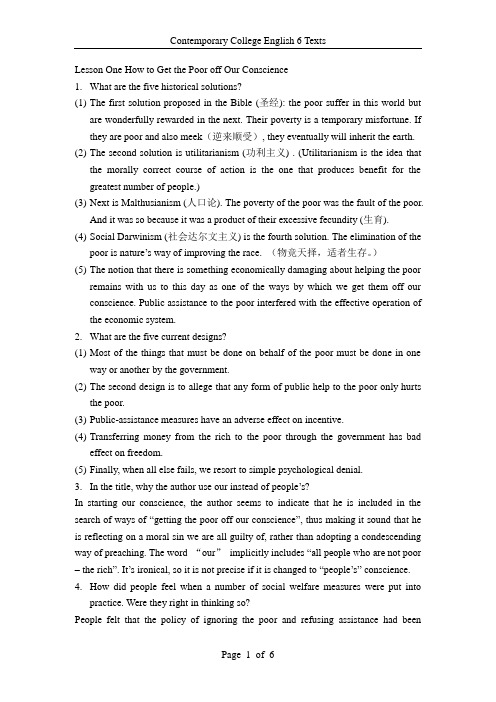
Lesson One How to Get the Poor off Our Conscience1.What are the five historical solutions?(1)The first solution proposed in the Bible (圣经): the poor suffer in this world butare wonderfully rewarded in the next. Their poverty is a temporary misfortune. If they are poor and also meek(逆来顺受), they eventually will inherit the earth.(2)The second solution is utilitarianism (功利主义) . (Utilitarianism is the idea thatthe morally correct course of action is the one that produces benefit for the greatest number of people.)(3)Next is Malthusianism (人口论). The poverty of the poor was the fault of the poor.And it was so because it was a product of their excessive fecundity (生育).(4)Social Darwinism (社会达尔文主义) is the fourth solution. The elimination of thepoor is nature’s way of improving the race. (物竞天择,适者生存。
)(5)The notion that there is something economically damaging about helping the poorremains with us to this day as one of the ways by which we get them off our conscience. Public assistance to the poor interfered with the effective operation of the economic system.2.What are the five current designs?(1)Most of the things that must be done on behalf of the poor must be done in oneway or another by the government.(2)The second design is to allege that any form of public help to the poor only hurtsthe poor.(3)Public-assistance measures have an adverse effect on incentive.(4)Transferring money from the rich to the poor through the government has badeffect on freedom.(5)Finally, when all else fails, we resort to simple psychological denial.3.In the title, why the author use our instead of people’s?In starting our conscience, the author seems to indicate that he is included in the search of ways of “getting the poor off our conscience”, thus making it sound that he is reflecting on a moral sin we are all guilty of, rather than adopting a condescending way of preaching. The word“our”implicitly includes “all people who are not poor – the rich”. It’s ironical, so it is not precise if it is changed to “people’s” conscience.4.How did people feel when a number of social welfare measures were put intopractice. Were they right in thinking so?People felt that the policy of ignoring the poor and refusing assistance had beenabandoned. The government was making efforts to relieve the misery of the unfortunate, so they did not need to pay attention any more.They were not completely right. While it was true that many measures had been implemented and were working, the desire to get the poor off our conscience still lingered on, waiting for a chance to come back.Lesson Two The Woods Were Tossing with JewelsWhat does “jewels” mean in the title?(1)The author compares “the birds in the woods”to “jewels”because of theirbrightly colored plumage (羽毛), and since the birds flew back and forth across the trail, the author felt as a little girl that the woods were tossing with jewels. (2)“Jewels”also symbolize some qualities, such as self-reliance (自信), freedom,courage, hard work, simple life, love of nature, love of family, trust and caring.Lesson Three At War with the Planet1.What are the two worlds that people live in? What is the common, unthinkingattitude towards the two worlds?(1)The two worlds refer to natural world and the world of human creation.(2)The attitude is: we are responsible for events of our own world, but not for whatoccurs in the natural world.2.What’s the purpose of the author’s writing?The purpose is not to support the ecosphere or the technosphere, but to find a way to end the war and to allow peaceful accommodation to the needs of the natural order. 3.What are the two spheres? And their differences?The two spheres refer to ecosphere and technosphere.According to the author, the ecosphere refers to the air, water and soil that cover the Earth and the plants and animals that live on it. The technosphere means man-made things.(1)The ecosphere is an elaborate(精细的) network, in which each component part islinked to many others. In the technosphere, the component parts have a very different relation to their surroundings.(2)The ecosphere process is closed cyclical(循环),while the process of technosphereis linear(直线).(3)The ecosphere is consistent and harmonious, while the technosphere is full ofrapid change and variation.4.What are the three laws?(1)Everything is connected to everything else.(2)Everything has to go somewhere.(3)Nature knows best.Lesson Four Nettles1. What does “Nettles” mean?The narrator remembered the Nettles. But those plants with big pinkish-purple flowers are not nettles. They are called joe-pye weeds. In fact nettles are stinging insignificant-looking plants with stalks outfitted with skin-piercing spines. Her mistaking joe-pye weeds for weeds for nettles implies that ordinary life is more like the insignificant-looking nettles that are stinging and piercing, thus irritating and annoying people rather than the joe-pye weeds with snowy pinkish-purple flowers. Real life is disturbing, frustrating and unsettling, offering no tidy resolution.2. What’s the narrator’s new perception of love at last?What happened, or rather what did not happen between Mike and her gave her a new perception of love. Love that was not usable, that knew its place. Not risking a thing yet staying alive as sweet trickles, an underground resource. This is the theme of the story. The event that took place during that weekend may not seem very special or exciting, but through it the author explores the complexity of human emotions and the beauty of ordinary life.3. The symbol of stormDuring the storm, the two were holding each other tightly, but they did that to protect themselves from the terrible storm. Now they kissed and pressed together because they had just survived a devastating storm, a dangerous situation. They did that embraced as a spontaneously shared ritual. At this moment, lust that had disturbed her in the night gave way to this sense of togetherness. We can see that in a sense, the rain had washed away the lust and purified her mind, thus purifying their relationship, too.Lesson Five One against the Many1.What do “one” and “many” mean? What does the author really want to tell us? They refer to “one viewpoint”and “many viewpoints”. In other words, the author regards pragmatism as the key factor which contributed to the rapid development of the United States.2.Some words about “one” and “many”One: ideology, dogma, hedgehogs, creed, proposition.Many: ideal, pragmatism, empiricism, empirical, practical, process, foxily.3.What are the factors which contribute to the rapid development of the UnitedStates?(1)One factor was deep faith in education.(2)Another factor in the process of American development has been the commitmentto self-government and representative institutions. A related factor has been the conviction of the importance of personal freedom and personal initiative –the feeling that initiative the individual is the source of creativity. Another has been the understanding of the role of cooperative activity, public as well as voluntary. (3)But fundamental to all of those has been the national rejection of dogmaticpreconceptions about the nature of the social and economic order.Lesson Six Death of a Pig1.What is the scheme of raising a pig?Buy a piglet in blossom time, feed it through summer and fall, and then butcher it when the solid cold weather arrives.2.Is the story a tragedy or comedy?Although the author humorously describes the death of his pig, he sho ws great sympathy, worry, and sadness. On the whole, the story should be considered as a tragedy instead of a comedy.3.What is the message the author wants to express?White, however, is not merely portraying a tragic scene; he is conveying an important message. To him, time may be circular for the seasons, the weather, and human nature, but for human, or animals in this case, time is painfully one-directional.4.What does the author think through the pig’s pain and suffering?The pain and suffering of the pig made him think of the fate of man and insecure, suffering world. He wrote, “the pig’s imbalance became the man’s vicariously, and life seems insecure, displaced, transitory”. When the pig finally died, White felt notthe loss of ham, but the loss of pig because it “had suffered in a suffering world”. The author is aging and dying. To him, the suffering of the pig symbolizes the suffering of human beings.Lesson Seven1.What is an inaugural address?Presidential inauguration is a solemn occasion which requires a formal speech. Hence the employment of pseudo-Roman and biblical language to add solemnity. The occasion also demands that the speech should be short, forceful and appealing to emotion. Hence the speech uses structure, antithesis and anaphora and includes the memorable statement of “Ask not what your country can do for you; ask what you can do for your country.”2.What’s the purpose of his speech?Against such a domestic and international background, Kennedy’s speech was designed to convince and persuade. Kennedy wanted to convince the American people and the world that the President and his team were capable of leadership, with vigor and vision. He needed to persuade the allies to stand with the United States, as well as to persuade newly independent countries and other poor Third World countries that the new administration would be friendly to them. Further Kennedy hoped to persuade the Soviet Union and the other Warsaw Pact countries that the new administration bore them no ill-will and wanted to work with them for peace and prosperity.3.What is the nature of the struggle?This is a struggle for peace, democracy and prosperity. The enemies of the struggle are tyranny, poverty, disease, war and natural disasters. These enemies are the common enemies of all of us.4.The functions of Chinese President?LeaderTo serve the people as a servant.5. What does “torch” refer to?The torch refers to the spirit of the First Revolution. The First Revolution refers to the War of Independence. It is considered to be the first successful bourgeois revolution in the world.Lesson Nine The Bluest Eye1. Symbol of The bluest eyesIt refers to goodness happiness and beauty in the white society, while blackness is perceived ugliness.Pecola’s greatest desire is to have blue eyes. She believes that her ugliness is the source of all her misery and that having blue eyes will be the key to happiness. She is convinced that if she had blue eyes, she would become pretty and happy that a ll her problems would be gone. She would become a beautiful girl loved by everyone.2. Wind and Snow(最后一段)the author describes how Pecola walks away from the house in a cold wind. A cold wind is blowing and snow is dying on the pavement, which implies that something in Pecola’s heart also has dead. The cold wind and snow reflect the coldness Pecola feels after the event; the coldness in nature reflects the coldness in human relationships.。
西南大学《综合英语六》网上作业题及答案

[0063]《综合英语六》第一次作业[判断题]Americans are responsible in their treatment of land.参考答案:错误[判断题]Thomas Hardy was unsympathetic to Tess.参考答案:错误[判断题]London was interesting in the eyes of Lawrence.参考答案:错误[判断题]Lawrence was an American poet.参考答案:错误[判断题]The girl in Lesson 4 died.参考答案:正确[判断题]Mental depression only hits the old people.参考答案:错误[判断题]Mental depression means high spirits.参考答案:错误[判断题]The 38 people called the police in time.参考答案:错误[判断题]Hughes believed in God for the rest of his life.参考答案:错误[判断题]Hughes was about 13 years old when he had his first religious experience.参考答案:正确第二次作业[判断题]Steinbeck was a poet.参考答案:错误[判断题]John Steinbeck criticized the Americans for their attitude towards the land. 参考答案:正确[判断题]George Orwell died of consumption.参考答案:正确[判断题]The 38 people called the police before it was too late.参考答案:错误[判断题]Hughes was an English poet参考答案:错误[判断题]Hughes didn't cry that night.参考答案:错误[判断题]Langston Hughes was 31 when having his first religious experience.参考答案:错误[判断题]Hughes believed in the existence of God.参考答案:正确[判断题]George Orwell never had any experience of being poor.参考答案:错误[判断题]Body language is the opposite of nonverbal communication.参考答案:错误第三次作业[论述题]What is a short story?参考答案:Short story:Though it is a fictional prose narrative that varies widely in length, a typical short story is shorter than a novel or novelette. Short stories range from the short short-story to the novelette or novella. Still, it is hard to tell the difference between a short story and a short novel or novelette, and it is equally difficult to distinguish a novelette from a novel. To determine which is which, some examples may be of help: Ernest Hemingway's "A Clean Well-Lighted Place” is a short short-st ory; Washington Irving's "Rip Van Winkle” is a short story; John Steinbeck's "The Pearl” is a novelette; and Henry James's The Portrait of a Lady is a novel.The short story usually has a single setting, a single episode, a single effect, and often one or t wo characters, and it has many of the characteristics of the novel―plot, theme, characterization, and so on.[论述题]Please define the sonnet according to Lesson Eighteen.参考答案:Sonnet: A fourteen-line lyric poem originated in Italy in the 13th century and imported to England by Thomas Wyatt and the Earl of Surrey in the early 16th century. Three major types of sonnets are distinguished: the Italian or Petrarchan sonnet, the Shakespearean or English sonnet, and the Spenserian or linked sonnet.The English or Shakespearean sonnet has three four-line quatrains and a final couplet rhymed abab cdcd efef gg. The quatrains put forth a question or narrative, and the couplet provides a comment. The Spenserian sonnet, which is also organized into three quatrains and a couplet, links the quatrains with a chain or interlocked rhyme scheme: abab bcbc cdcd ee. The Spenserian sonnet is like the Petrarchan sonnet in that its theme is developed in two parts: the final six lines resolve a problem, or comment upon a narrative, or apply a proposition put forward in its first eight lines.第四次作业[论述题]What is a hyperbole?参考答案:Hyperbole: a figure of speech in which there is an exaggeration and overstatement of the truth and fact. Examples are "It is ages since I saw you last time”; "She is dying to know what you mean”; and "I've told you a million times not to smoke here.”[论述题]What is a simile? Please define it in detail.参考答案:Simile: A figure of speech in which an explicit comparison is made between two distinctly different things. The comparison is made explicit by the use of such words as "like” and "as.” Sometimes, similes are even introduced by words like compare, liken, resemble, than, appears, and seems. A metaphor differs from a simile in that it is without the word "like” or "as.”It is a compressed simile. But the use of "like” or "as” in a sentence or line does not always indicate there is a simile in it. For example, there is no simile if one says "The child looks like hisfather.” Though comparison does exist here, it is not made between two essentially dissimilar things. Famil iar instances of similes are "as stubborn as a mule,” "as clear as a bell,” "as fast as the wind,” "as timid as a hare,” "as cool as a cucumber,” and "He smokes like a chimney.”第五次作业[论述题]What is personification?参考答案:Personification: Also known as "p rosopopoeia,” it is a figure of speech in which animals, ideas, abstractions and inanimate things are treated as human beings. An example is:Spring blew its trumpet of color.Her green sang in my mind.[论述题]What kind of person was Langston Hughes? (about 200 words)参考答案:James Langston Hughes was born February 1, 1902, in Joplin, Missouri. His parents divorced when he was a small child, and his father moved to Mexico. He was raised by his grandmother until he was thirteen, when he moved to Lincoln, Illinois, to live with his mother and her husband, before the family eventually settled in Cleveland, Ohio. It was in Lincoln, Illinois, that Hughes began writing poetry. Following graduation, he spent a year in Mexico and a year at Columbia University. During these years, he held odd jobs as an assistant cook, launderer, and a busboy, and travelled to Africa and Europe working as a seaman. In November 1924, he moved to Washington, D.C. Hughes's first book of poetry, The Weary Blues, was published by Alfred A. Knopf in 1926. He finished his college education at Lincoln University in Pennsylvania three years later. In 1930 his first novel, Not Without Laughter, won the Harmon gold medal for literature.Hughes, who claimed Paul Lawrence Dunbar, Carl Sandburg, and Walt Whitman as his primary influences, is particularly known for his insightful, colorful portrayals of black life in America from the twenties through the sixties. He wrote novels, short stories and plays, as well as poetry, and is also known for his engagement with the world of jazz and the influence it had on his writing, as in "Montage of a Dream Deferred." His life and work were enormously important in shaping the artistic contributions of the Harlem Renaissance of the 1920s. Unlike other notable black poets of the period―Claude McKay, Jean Toomer, and Countee Cullen―Hughes refused to differentiate between his personal experience and the common experience of black America. He wanted to tell the stories of his people in ways that reflected their actual culture, including both their suffering and their love of music, laughter, and language itself.Langston Hughes died of complications from prostate cancer in May 22, 1967, in New York. In his memory, his residence at 20 East 127th Street in Harlem, New York City, has been given landmark status by the New York City Preservation Commission, and East 127th Street has been renamed "Langston Hughes Place."第六次作业[论述题]What is metaphor?参考答案:A metaphor is a figure of speech in which one thing is described in terms of another. In a metaphor there is an implicit comparison between two things which are essentially different. There is, however, a common quality shared by the two things compared. A metaphor, unlike a simile, is without such words as "like” or "as.”A metaphor can be used for emphasis, ornament, defamiliarization, and the like. [论述题]How much do you know about John Steinbeck, the author of Lesson Six? (about 350 words)参考答案:John Ernst Steinbeck was born on the 27th of February, 1902 in Salinas, California. His father, John Steinbeck Sr. worked as the Monterey County Treasurer and his mother Olivia used to work as a schoolteacher. She encouraged her son's love for reading and writing.During the school summer holidays, Steinbeck used to work as a hired hand on the nearby ranches. He attended the Stanford University till 1925. He left the university without graduating so as to pursue his dream to become a writer.Facts About John Steinbeck: Writing CareerJohn Steinbeck's first novel was titled ‘Cup of Gold' and was published in 1929. In 1935 he published ‘Tortilla Flat' which received critical acclaim and won the California Commonwealth Club's Gold Medal. In 1942 his book titled ‘Great Depression' which depicted the adventures of young men in Monterey during the great depression was made into a movie starring Spencer Tracy.John Stei nbeck had found his ‘writer's voice' writing fiction set in the area known as the California Dust Bowl and in the time of the great depression.In 1937 he wrote ‘Of Mice And Men', a novella based on the dreams of two migrant workers who were working to save money to buy their own ranch. The novella was centered on the themes of loneliness, racism and the struggle for independence. this movie was made into a stage production. Steinbeck however, refused to attend the play because he claimed that the play as it existed in his head was perfect, and anything else would be a disappointment. This book was also made into major movies, three different times: 1939, 1982 and in 1992.In 1939, he published ‘The Grapes of Wrath' where he describes the perils of a fam ily of sharecroppers who are driven from their land due to the dust storms in the California Dust Bowl. The book is set in the time of the great depression. This book also was translated into a major movie production in 1940. In 1940, this book received the prestigious Pulitzer Prize.‘The Grapes of Wrath' attracted its share of controversy, however. It showed the ugly side of capitalism and the re-interpretation of the events of the Dust Bowl migrations led to people claiming that the book misrepresented facts about the area. The book was even banned from public schools and libraries till 1941.In 1940, Steinbeck and his friend Ed Ricketts voyaged in the Gulf of California which is also known as the Sea of Cortez. A narrative of this account was publish ed by Steinbeck in ‘The Log from the Sea of Cortez'. However, this book came out at the same time as the bombing of Pearl Harbor and thus went largely unnoticed.Steinbeck wrote a novel titled ‘The Moon Is Down' also became a major film and earned him th e Haakon VII Medal of Freedom for his literary contributions to the Norwegian resistance movement.During the World War II, Steinbeck also worked as a war correspondent for the New York Herald Tribune. The collected writings of Steinbeck during these day s were published in ‘Once There Was a War' in 1958.Meanwhile, in 1944, Steinbeck also wrote the script for Alfred Hitchcock's film ‘Lifeboat' and then for another film titled ‘A Medal For Benny' in 1945.In 1947 he wrote ‘The Pearl' which also became a major motion film. He also wrote a film script based on the life of Emiliano Zapata, titled ‘Viva Zapata!' which was also made into a major film.A humorous account of Steinbeck's travels to Russia with the renowned photographer Robert Capa was publish ed in 1948 with the title ‘A Russian Journal'.In 1952, following the divorce of his second wife, Gwyndolyn Conger, and the tragic demise of his best friend Ed Ricketts, he wrote ‘East of Eden'. The movie production of this book was James Dean's film debut.In 1960, he wrote ‘Travels With Charley: In Search Of America' which detailed his coast to coast road trip across America in a modified camper truck with his poodle Charley. In the book he also described how he missed his lost youth and the intolerance of America at several levels.In 1961, he wrote ‘The Winter of Discontent' which described the moral decay within the American culture. This novel was not quite popular with the critics.In 1962, he won the Nobel Prize for Literature for his "realistic and imaginative writing, combining as it does sympathetic humor and keen social perception".In 1964 he won the United States Medal for Freedom at the hands of President Johnson.In 1967 he went to Vietnam for the Newsday Magazine to report on the Vietnam War.Private Life of John SteinbeckIn 1943 Steinbeck divorced his wife Carol Henning and married Gwyndolyn Conger. They had two sons:Thomas Myles and John Steinbeck IV. They divorced in 1948. In 1950, he married Elaine Scott. They remained married till Steinbeck's death.John Steinbeck died on the 20th of December, 1968 in Manhattan, New York, of heart failure. In keeping with his wishes, he was cremated and the urn containing his。
新编实用英语综合教程1-unit 6-教案

What do you feel like doing exactly?
Xiao Li: I haven't made up my mind yet. What do you think?
The General Bob: How about a bicycle ride to the lake area?
页脚内容4
Lesson 1 Dedication
sports event poster, or for inviting people to watch a sports game. 3. Students practice the dialogues in groups. 4. Give students several minutes to prepare short conversations in pairs by
8. make it look attractive
9. highlight
1. well done 2. It is …who… 3. too … to 4. multi-purpose 5. 21st Century 6. eager 7. the English corner 8. I do feel a bit like a fish a
fish out of water here.
页脚内容2
序号
◆ Pre-teaching
Lesson 1 Dedication
知识点
Introduction ---- Teaching Plan
知 Lead-in ---- Business Cards and Passport
识
点 ◆ While-teaching
Oh, yes, and perhaps the barbecue grills. Xiao Li: Barbecue grills? All right. With them we can have a good picnic
综合英语(一)上下两课文和翻译

综合英语(一)上Lesson OneThe Time MessageElwood N. ChapmanLearning Guide新的学习任务开始之际,千头万绪,最重要的是安排好时间,做时间的主人。
本文作者提出了7点具体建议,或许对你有所启迪。
1Time is tricky. It is difficult to control and easy to waste. When you look ahead, you think you have more time than you need. For example, at the beginning of a semester, you may feel that you have plenty of time on your hands. But toward the end of the term you may suddenly find that time is running out. You don't have enough time to cover all your duties, so you get worried. What is the answer?Control!时间很难对付,既难控制又易浪费。
当你向前看时,觉得有用不完的时间。
比如说,学期伊始,你可能会觉得有大量的时间,可到期末时,突然发现时间就要用完了,已没有足够的时间去做应做的一切了,于是,你就很担心。
解决问题的方法是什么?那就是控制!2Time is dangerous. If you don't control it, it will control you. If you don't make it work for you, it will work against you. So you must become the master of time, not its servant. As a first-year college student, time management will be your number one problem.时间很危险。
人教精通版六年级英语下册Unit 1 综合素质评价试卷 附答案 (2)
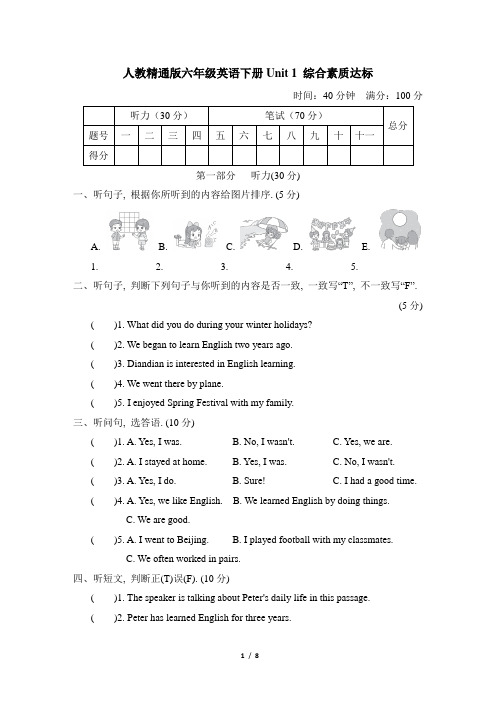
人教精通版六年级英语下册Unit 1 综合素质达标时间:40分钟满分:100分听力(30分)笔试(70分)总分题号一二三四五六七八九十十一得分第一部分听力(30分)一、听句子, 根据你所听到的内容给图片排序. (5分)A. B. C. D. E.1. ________2. ________3. ________4. ________5. ________二、听句子, 判断下列句子与你听到的内容是否一致, 一致写“T”, 不一致写“F”.(5分) ()1. What did you do during your winter holidays?()2. We began to learn English two years ago.()3. Diandian is interested in English learning.()4. We went there by plane.()5. I enjoyed Spring Festival with my family.三、听问句, 选答语. (10分)()1. A. Yes, I was. B. No, I wasn't. C. Yes, we are.()2. A. I stayed at home. B. Yes, I was. C. No, I wasn't.()3. A. Yes, I do. B. Sure! C. I had a good time.()4. A. Yes, we like English. B. We learned English by doing things.C. We are good.()5. A. I went to Beijing. B. I played football with my classmates.C. We often worked in pairs.四、听短文, 判断正(T)误(F). (10分)()1. The speaker is talking about Peter's daily life in this passage.()2. Peter has learned English for three years.()3. The students in Peter's class can use English words in and out of class.()4. They are only interested in topics like school life and animals.()5. They learn from each other.第二部分笔试(70分)五、用所给词的适当形式填空. (5分)1. In ________ (group) we always helped each other.2. We enjoyed ________ (sunbathe) on the beach yesterday.3. I ________ (go) to Shanghai with my parents last week.4. Would you like ________ (tell) me about your English learning?5. There are five English ________ (lesson) in a week.六、单项选择. (10分)()1. What ________ you ________ during your holidays?A. do; didB. did; doC. did; did()2. — ________ did you learn English?—We learned English by ________ English songs.A. Why; listen toB. How; listening toC. How; listen()3. We enjoyed sunbathing ________ the day.A. ofB. atC. during()4. We can do things by ________.A. ourselfB. myselfC. ourselves()5. I'd like to go to the beach with you, ________ I am too busy now.A. butB. orC. and()6. Three years ago I ________ learn English.A. beganB. beginC. began to()7. Jack has learned ________ words.A. lot ofB. a lot ofC. a lot()8. That sounds ________!A. wonderfulB. wondersC. wonder()9. We can ________ games and ________ tasks.A. played; didB. to play; to doC. play; do()10. Our English teacher asked us ________ practice ________.A. to; writingB. /; writingC. to; write七、按要求完成句子. (10分)1. I had a good time. (改为一般疑问句)____________ you ____________ a good time?2. Mike did role play in the classroom. (改为否定句)Mike ____________ ____________ role play in the classroom.3. We went to Xi'an by plane. (对画线部分提问)____________ ____________ you ____________ to Xi'an?4. Did you enjoy your holidays?(作肯定回答)____________, I ____________.5. English, by, drama, learned, in, acting, We (. )(连词成句)________________________________________________________________ 八、补全对话. (5分)John: You look sad. What's the matter?Kate : I have trouble (困难) in learning English. I can't remember the English words. 1. ________John : I learn English words by using them. 2. ________Kate : Then how about talking? I can't talk with others in English.John : 3. ________Kate : By the way, do you do tasks in English?John : Yes. 4. ________Kate : I will try my best to learn English. Thank you.John : 5. ________ I hope you can improve your English.九、根据首字母提示, 完成短文. (10分)During last summer 1. h , I went to Shanghai with my parents. We went there by 2. p . We 3. s in a hotel by the sea.During the day, we went to the beach. And 4. a night, we enjoyed the 5. m and stars. We 6. h a good time during last summer holidays.十、阅读理解. (20分)(一)Longlong正在向Huahua介绍上个暑假和妈妈去北京拍的一张照片.根据对话内容, 判断正(T)误(F)(10分)() 1. Longlong went to Beijing with his mother last summer.() 2. They went to Beijing by plane.() 3. They stayed in a hotel by the sea.() 4. They enjoyed a lot of food.() 5. They had fun in Beijing.(二)Hello, I'm Eric. Last year, we had an English teacher from the United States.We called him Mr Black. He often told us that English was very useful. He taught us very well. He was strict (严格的) with all of us. In class, he always gave us much time to speak English. At first, I could hardly understand any words and I could not talk in English at all. But soon I found English was not so difficult and I could talk to my classmates in English. So I began to like it. Now Mr Black worksin another school. This year we have a new teacher, Mrs Green. She also teaches us very carefully. She often asks us to recite (背诵) the texts and play games. With the help of the two teachers, I have made great progress. Now I enjoy studying English. I am sure I will learn a lot this year.根据上文所给的信息选择正确的选项. (4分)()1. This passage is about Eric's________.A. hobbyB. daily lifeC. English teachersD. family()2. In class, Mr Black always gave the students much time to ________.A. speak EnglishB. do tasksC. write EnglishD. tell stories判断下列句子正(T)误(F). (4分)()3. Mr Black is our new English teacher this year.()4. At first, Eric could hardly understand any words and he could not talk in English at all.根据短文回答问题. (2分)5. Did Eric make great progress with the help of the two teachers?_______________________________________________________________ 十一、书面表达. (10分)同学们, 三年的英语学习一定让你们收获很多. 请你们先认真读一读Bob 的介绍, 然后带着“How did you learn English?”这个问题, 谈一谈你们的英语学习吧!Hi, everyone! My name is Bob. I'm in Sunny School. We began to learn English three years ago. I often spoke English with my friends after class.Sometimes I went to the English Corner. I like listening to English songs and watching English cartoons. I love English.__________________________________________________________________ __________________________________________________________________ __________________________________________________________________ ____________________________________________________________________________________________________________________________________ __________________________________________________________________ __________________________________________________________________ __________________________________________________________________ __________________________________________________________________ __________________________________________________________________ __________________________________________________________________Unit 1综合素质达标听力材料:一、1. She had a birthday party at home last Sunday.2. They learned English by doing tasks.3. I went to Sanya during the holidays.4. She often listens to English.5. We enjoyed the moon and stars at night.二、1. What did you do during your summer holidays?2. We began to learn English three years ago.3. Diandian is interested in English learning.4. We went there by plane.5. I enjoyed Spring Festival with my mother.三、1. Are you interested in English?2. What did you do during your holidays?3. Did you have a good time?4. How did you learn English?5. Where did you go last weekend?四、Peter likes English. He has learned English for six years. Mr Green is hisEnglish teacher. He teaches very well. They often talk in English. The students in Peter's class can use English words in and out of class. They are interested in topics like food, shopping, school life and animals. Their teacher often asks them to practise listening, speaking, reading and writing. They learn from each other.答案:一、1. D 2. A 3. C 4. B 5. E二、1. F 2. F 3. T 4. T 5. F三、1. C 2. A 3. B 4. B 5. A四、1. F 2. F 3. T 4. F 5. T五、1. groups 2. sunbathing 3. went 4. to tell 5. lessons六、1. B 2. B 3. C 4. C 5. A6. C7. B8. A9. C10. A七、1. Did; have提示: 句子时态为一般过去时, 谓语动词为实义动词, 变一般疑问句时助动词用did, 谓语动词用原形.2. didn't do3. How did; go4. Yes; did5. We learned English by acting in drama.八、1. E 2. A 3. B 4. D 5. C九、1. holidays 2. plane 3. stayed4. at5. moon6. had十、(一)1. T 2. F 3. F 4. T 5. T(二)1. C 2. A 3. F 4. T5. Yes, he did.十一、范文:Hello, everyone! I'm Peter. I'm in Class One, Grade Six. Let me tell you about my English learning. Three years ago I began to learn English. I listened to the teacher carefully in class and I always read English books and stories after school.Sometimes I played games in English with my friends. Practice makes perfect.。
- 1、下载文档前请自行甄别文档内容的完整性,平台不提供额外的编辑、内容补充、找答案等附加服务。
- 2、"仅部分预览"的文档,不可在线预览部分如存在完整性等问题,可反馈申请退款(可完整预览的文档不适用该条件!)。
- 3、如文档侵犯您的权益,请联系客服反馈,我们会尽快为您处理(人工客服工作时间:9:00-18:30)。
Lesson OneTEXTSexism in School(学校中的性别歧视)-Boys still get more attention than girls doBy Myra and David SadkerIf a boy calls out in class, he gets the teacher’s attention. If a girl calls out in class, she is told to raise her hand before speaking.如果一个男孩在课堂上喊出来,他会得到老师的关注,如果一个女孩在课堂上喊出来,她会被告之先举手再发言。
Teachers praise boys more than girls, give boys more academic help and are more likely to accept boys’ comments during classroom discussions. These are only a few examples of how teachers favor boys. Through this advantage boys increase their chances for better education and possibly higher pay and quicker promotions. Although many believe that classroom sexism disappeared in the early 70s, it hasn’t.老师表扬男孩比女孩多,会给男孩更多的学业帮助,老师更能接受男孩在课堂讨论中评论。
这只是一些老师怎样偏爱男孩的例子。
通过这样的优势,男生就能增加更好的教育机会,可能得到高工资或者晋级快。
虽然许多人认为课堂歧视在70年代早就消失了,但它并没有消失。
Education is not a spectator sport. Numerous researchers, most recently John Goodlad, former dean of education at the University of California at Los Angeles and author of “A Place Called School,” have shown that when students participate in classroom discussion they hold more positive attitudes toward school, and that positive attitudes enhance learning. It is no coincidence that girls are more passive in the classroom and score lower than boys on SATs.教育不是一种供认观看的体育运动。
许多研究者,最近的有加州大学洛杉矶分校前教育系系主任John Goodlad,也是“一个被称为学校的地方”的作者,他们表明,当学生参与课程讨论时,他们对学校持有更积极的态度,这种积极的态度能增进学习。
女生在课堂上比较被动,在高考中比男生得分低,这决不是一种巧合。
Most teachers claim that girls participate and are called on in class as often as boys. But a three-year study we recently completed found that this is not true; vocally, boys clearly dominate the classroom. When we showed teachers, and administrators a film of a classroom discussion and asked who was talking more, the teachers overwhelmingly said the girls were. But in reality, the boys in the film were out-talking the girls at a ratio of three to one.大多数老师称,女生参加课堂讨论和男生一样,也经常被提问。
但刚刚完成的长达三年的研究发现,不是这样的,男生显然会控制整个课堂氛围,当我们给老师、行政人员看了课堂讨论视频,问谁说的多时,老师们异口同声说女生说得多。
但事实上,视频中,男生比女生说得多的比例是3:1Field researchers in our study observed students in more than 100 fourth-, sixth- and eighth-grade classes in four states and the District of Columbia. The teachers and students were male and female, black and white, from urban, suburban and rural communities. Half of the classroom covered language arts and English-subjects in which girls traditionally have excelled; the other half covered math and science- traditionally male domains.在我们的研究中,实地研究者对四个州的小学4年级,6年级,初中2年级以及哥伦比亚特区等100多个班级的学生进行了观察。
老师和学生有男的,女的,黑人,白人,来自城市的,郊区的,农村社区的。
一半的课程是语言艺术和英语,这些课程传统上是女生占优势;另一半课程是数学和科学,这些传统上是男生的领域。
We found that at all grade levels, in all communities and in all subject areas, boys dominated classroom communication. They participated in more interactions than girls did, and their participation became greater as the year went on.我们发现所有的年级,所有的社区,所有的学科中,都是男生控制住了课堂交流,他们比女生参与课堂互动多,随着时间的推移,他们参与的越来越多。
Our research contradicted the traditional assumption that girls dominate classroom discussion in reading, while boys are dominant in math. We found that whether the subject was language arts and English or math and science, boys got more than their fair share of teacher attention.我们的研究否定了传统的假设,,女生在阅读课上统治课堂讨论,而男生则是在数学课上。
我们发现不管是在语言艺术,英语还是数学,科学这些科目中,往往是男生得到老师的关注要比女生多。
Some critics claim that if teachers talk more to male students, it is simply because boys are more assertive in grabbing their attention- a classic case of the squeaky wheel getting the educational oil. In fact, our research shows that boys are more assertive in the classroom. While girls sit patiently with their hands raised, boys literally grab teacher attention. They are eight times more likely than girls to call out answers. However, male assertiveness is not the whole answer.有些批评家声称,如果老师对男生说得多,这仅仅是因为男生在吸引老师,注意力上更加自信,这是个经典的例子,吱嘎响的轮子就能被上油。
事实上,我们的研究表明,在课堂上,男生确实比女生更加自信,当女生举着手耐心地坐着时,男生就已把老师的注意力吸引了,男生积极地说出答案是女生的8倍,然而,整个答案并不是男生的自信。
~~~~~~~~~~~~~~~~~~~~~~~~~~~~~~~~~~~~~~~~~~~~~~~~~~~~~~~~~~~ The message is subtle but powerful: Boys should be academically assertive and grab teacher attention; girls should act like ladies and keep quiet~~~~~~~~~~~~~~~~~~~~~~~~~~~~~~~~~~~~~~~~~~~~~~~~~~~~~~~~~~~ Teachers behave differently depending on whether boys or girls call out answers during discussions. When boys call out comments without raising their hands, teachers accept their answers. However, when girls call out, teachers reprimand this ”inappropriate” behavior with messages such as, “In this class we don’t shout out answers, we raise our hands.” The message is subtle but powerful: Boys should be academically assertive and grab teacher attention; girls should act like ladies and keep quiet.在课堂讨论中,对答案是由男生还是女生说出,老师会有不同的行为。
